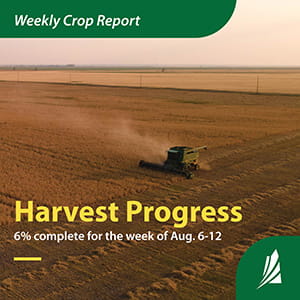Released on August 15, 2024
Harvest is underway in many areas of the province as hot and dry conditions continue to advance crop maturity. Producers that haven't begun to harvest continue to desiccate, empty grain bins and prepare equipment. Pasture conditions in much of Saskatchewan are diminishing due to the hot and dry conditions. Sporadic rainfall in north and east parts of the province will benefit later seeded crops as they mature, but it is too late to benefit early seeded crops.
With more producers beginning to harvest in Saskatchewan, harvest progress has increased in the last week and is currently six per cent complete. This is slightly above the five and 10-year averages, both of which are five per cent. The southwest is the furthest ahead in the province with 16 per cent harvest complete in this region. The southeast trails behind with 11 per cent of crops harvested. Harvest is just beginning in central Saskatchewan with only two per cent complete in the east-central region and one per cent complete in the west-central region. Harvest has yet to start in both northwest and northeast Saskatchewan, but producers are ready to go when crops are ready.
Winter wheat and fall rye harvested acres have greatly increased in the last week. Provincially, 55 per cent of winter wheat is harvested, which is up 43 per cent in the last week, and 42 per cent of fall rye is harvested, which is up 27 per cent from a week ago. Pulse crop harvest continues as 28 per cent of lentils and 26 per cent of field peas are now harvested. Triticale is the leading spring-seeded cereal crop as 28 per cent of crops have been harvested, followed by eight per cent of barley crops now taken off. Three per cent of durum and two per cent of spring wheat have been combined. Harvest progress for oilseeds is insignificant as only one per cent of canola and mustard have been harvested.
Certain areas in northern and eastern regions received notable rainfall this week that will benefit later seeded crops and pasture conditions. The Kuroki area received the most rainfall this past week with 55 mm. The second highest rainfall was recorded around Wadena with 48 mm, followed by the Kelvington area with 36 mm. The Rose Valley and Middle Lake areas received notable rainfall as well with 35 mm in each area.

With the overall dry conditions this past week, topsoil moisture conditions continue to diminish. Cropland topsoil moisture is currently 29 per cent adequate, 48 per cent short and 23 per cent very short. Hayland topsoil moisture is 24 per cent adequate, 47 per cent short and 29 per cent very short. Pasture topsoil moisture is 16 per cent adequate, 47 per cent short and 37 per cent very short.
The limited rainfall in Saskatchewan is also impacting livestock water supplies and some livestock producers are concerned about water availability for their animals. Provincially, one per cent of livestock water supplies are severely short, 31 per cent are moderately short, 22 per cent are anticipated to be short in the next couple months and 47 per cent are not expected to be short for the foreseeable future. When asking producers if they are concerned about water availability on their farm, 77 per cent indicated they aren't concerned while 23 per cent said they are.
The majority of crop damage in Saskatchewan this week was from dry conditions paired with hot temperatures. Grasshopper damage to crops was also reported during this period, which is not surprising as hot and dry conditions generally promote grasshopper activity. Symptoms of sclerotinia stem rot are showing up in several canola fields and many crops this past week also experienced wind and aphid damage.
Harvest is a busy time in Saskatchewan and everyone is reminded to prioritize safety this fall. The Farm Stress Line is a toll-free number that producers can use to help manage their stress during this busy time, which can be reached at 1-800-667-4442. Producers should be aware of physical hazards such as fire, powerlines, etc. and take preventative measures to avoid incidents. The public is reminded that there is more heavy equipment traffic on roads during harvest, and to be patient by giving machinery extra time and space.
A complete, printable version of the Crop Report is available online - Download Crop Report.
Follow the 2024 Crop Report on Twitter at @SKAgriculture.
-30-
For more information, contact:

